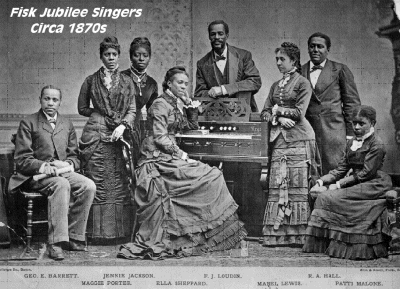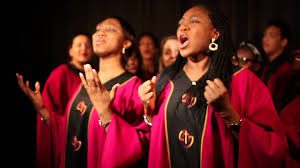Origin and Influences

By defintion, negro spirituals are ” the earliest form of religious music to develop among African Americans in the United States”(Burnim 50). Created during slavery, the main goal of spirituals was to “symbolize the slave populations unique expression of Christian religious values and ideals”(Burnim 50). However, although they did represent their newly adopted religious beliefs, these spirituals also contradicted the traditional hymns favored by the Europeans.
Elements

Although there are many characteristics of negro spirituals, some very important elements of are arranged/concert spiritual, double entendre, and ring shout. By defintion, an arranged/concert spiritual is “the post-Civil War form of spirituals in a fixed, non-improvised form, which evolved in schools created to educate emancipated slaves”(Burnim 62). This form of negro spirituals is important because the ” true meaning and significance” (Burnim 60) of negro spirituals “began to resonate beyond the Black community”(Burnim 60). In terms of double entendre, this means that the text has a double meaning. This element can be found in spirituals that “conveyed slaves’ desire for freedom” (Burnim 54) such as Run Mary, run. In terms of ring shout, this was ” a form of folk spiritual characterized by leader-chorus antiphonal singing, hand clapping, and other percussion”(Burnim 55). Examples of this element include the McIntosh Shouters of the Georgia Sea Islands.
Primary Performers & Composer
Some primary performers and composers of the negro spiritual genre include Harry T. Burleigh, Marian Anderson, and Paul Robeson. Harry T. Burleigh was “the first person to arrange the Negro spiritual for solo voice”(Burnim 63). In addition, he also wrote Jubilee Songs of the US, which included his most popular song “Deep River” . Marian Anderson, the first African American to sing at the Metropolitan Opera, was known for her performances of negro spirituals such as “Nobody Knows the Trouble I’ve Seen” . Paul Robeson, a renowned bass-baritone, is credited as ” the first to sing a concert comprised entirely of negro spirituals”(Burnim 65). In addition, he is known for his rendition of “Old Man River” .
Social Implications and Commodification

As a result of negro spirituals, blacks were able to build their own connection and interpretation of Christianity. In addition, it also gave blacks the freedom to not only express themselves through song, but find an escape from their harsh reality. However, the most important impact of negro spirituals was the ability it gave blacks to be the narrative of their own story. In terms of commodification, unlike folk music, blacks were not only able to create and sell negro spiritual books for substantial profits, but also acquire credit for their songs. Examples include Harry Burleigh’s Jubilee Songs of the U.S. and Slave Songs of the United States.
Influence on other Genres

Negro spirituals biggest influence has been on the gospel genre. Whether it be through elements such as call-response or heterophony, not only does gospel mirror spirituals, but it also shows the evolution of the genre. In addition, gospel music also shows how spiritual genres have become even more popular among all races. In fact, during the beginning of negro spirituals, whites did not like the blacks take on religious music. However, today’s gospel music is loved by people all around the world.
Summary

In conclusion, ” The Negro Spiritual as it was originally conceived was a richly textured mosaic of Christian belief intertwined with African-derived culture values”(Burnim 68). In addition, although negro spirituals embody the past of blacks, they have evolved to ” reflect…historical and cultural shifts”(Burnim 68). However, most importantly, spirituals have continued to be a pivotal part of black culture due to their ability to connect with all walks of life.
Work Cited
- Burnim, Mellonee. “African American Music: An Introduction.” Amazon. Amazon. 11 Feb. 2006 <https://www.amazon.com/African-American-Music-Mellonee-Burnim/dp/0415881811>.

